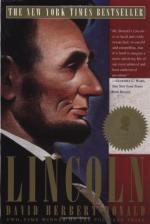|
This section contains 442 words (approx. 2 pages at 400 words per page) |

|
Lincoln Summary & Study Guide Description
Lincoln Summary & Study Guide includes comprehensive information and analysis to help you understand the book. This study guide contains the following sections:
This detailed literature summary also contains Topics for Discussion and a Free Quiz on Lincoln by David Herbert Donald.
"Lincoln" by Donald Herbert Davis is a biography of President Abraham Lincoln, who was born in February,1809 and assassinated in April, 1865. In his comprehensive look at Lincoln's life, Donald draws directly from Lincoln's own papers as well as from the written first-hand accounts of his contemporaries whenever possible. He carefully dispels some of the many myths that have arisen about Lincoln and provides evidence and examples of the ways in which Lincoln changed the role of President.
Donald tracks Lincoln from his poor roots in Kentucky to his young adulthood as a shopkeeper, surveyor, postmaster and finally lawyer in Illinois. He describes Lincoln's intense desire to escape the life of hard manual labor lived by his father, despite the later depiction by his political backers as a "rail-splitter" who did not shirk hard work. Lincoln's unremarkable early political career as a state legislator and then US Representative is described as well as his failed bid to be appointed senator for Illinois, which led to his famous debates with Stephen Douglas.
Lincoln is instrumental in the formation of the Republican Party, and Donald describes his exceeding ability in party politics, which leads eventually to his nomination as election as President. Donald carefully reconstructs the volatile political climate of Lincoln's day. Although he is widely accepted now as a national hero, Lincoln in his time faced considerable political opposition even from members of his own cabinet.
The major event of Lincoln's presidency is of course the American Civil War, and Donald depicts the emotional and physical strain the war has on Lincoln as he faces uncooperative generals, a bickering cabinet, a Congress that opposes him and a sometimes hostile public.
Throughout his book, Donald charts Lincoln's shifts of position on the issue of slavery and political equality for blacks, and to his change in the stated purpose of the war, which begins as as a fight to restore the Union and becomes in Lincoln's mind a fight for freedom and the end of slavery. These shifts cost Lincoln politically, but he manages to capitalize on a division among Democrats to win re-election.
In the final chapter, Donald brings the final threads of Lincoln's life together. The war is ended and Lincoln has set the country on the path toward reunification. The defeat of the South and his re-election are too much to take for some, such as the young John Wilkes Booth, who seeks to avenge the South by killing Lincoln. Donald chronicles Lincoln's last day, a day in which he seems in an unusually good mood, and a day which ends with his assassination at the hands of Booth.
Read more from the Study Guide
|
This section contains 442 words (approx. 2 pages at 400 words per page) |

|



